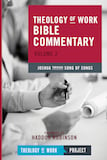Ahab and Jezebel Murder Naboth to Get His Property (1 Kings 21)
Bible Commentary / Produced by TOW Project
King Ahab abuses his power further when he begins to covet the vineyard of his neighbor, Naboth. Ahab offers a fair price for the vineyard, but Naboth regards the land as an ancestral inheritance and says he has no interest in selling at any price. Ahab dejectedly accepts this appropriate limitation of his power, but his wife Jezebel spurs him to tyranny. “Do you now govern Israel?” she taunts (1 Kings 21:7). If the king has no appetite for abuse of power, the queen does. She pays two scoundrels to bring a false charge of blasphemy and treason against Naboth, and he is quickly sentenced to death and stoned by the elders of the city. We are left to wonder why the elders acted so quickly, without even conducting a proper trial. Were they complicit with the king? Under his control, afraid of standing up to him? In any case, with Naboth out of the way, Ahab takes possession of the vineyard for himself.
Abuse of power, including land grabs as blatant as Ahab’s, continue today, as a glance at nearly any daily newspaper will confirm. And as in Ahab’s time, abuse of power requires the complicity of others who would rather tolerate injustice, even murder, than risk their own safety for the sake of their neighbors. Only Elijah, the man of God, dares to oppose Ahab (1 Kings 21:17-24). Although his protests can do nothing to help Naboth, Elijah’s opposition does curb Ahab’s abuse of power, and no further abuses are recorded in Kings prior to Ahab’s death. More often than we might expect, principled opposition by a small group or even a single individual can restrain the abuse of power. Otherwise, why would leaders go to so much trouble to hide their misdeeds? What do you estimate is the likelihood that you will become aware of at least one misuse of power in your working life? How are you preparing yourself to respond if you do?
Related Content
Popular Content
Popular Content
Table of Contents
-
- The Golden Age of the Monarchy: 2 Samuel 1-24, 1 Kings 1-11, 1 Chronicles 13, 21-25
- From Failed Monarchies to Exile (1 Kings 11 - 2 Kings 25; 2 Chronicles 10-36)
- Ahab and Jezebel Murder Naboth to Get His Property (1 Kings 21)
Related Content
Donate
Bookstore

Ethics is about knowing and doing what is good or right, and workplace ethics is about knowing and doing what is good or right at work. For the Christian, this means applying the Bible and other resources of the Christian faith to help decide and do what is ethical or moral at work.

(Volume 2: Joshua-Song of Songs) If you like reading the Theology of Work Bible Commentary free online, you might enjoy it in print!—Business, education, law, service industries, medicine, government - wherever you work, in whatever capacity, the Scriptures have something to say about it.

The Theology of Work Bible Commentary is an in-depth Bible study tool put together by a group of biblical scholars, pastors, and workplace Christians to help you discover what the whole Bible--from Genesis to Revelation--says about work. Business, education, law, service industries, medicine, government--wherever you work, in whatever capacity, the Scriptures have something to say about it. This edition is a one-volume hardcover version.
Bible
Copyright
Contributors: Jill Baker, Brian Housman and Alice Mathews
Adopted by the Theology of Work Project Board June 2, 2014.
Theology of Work Project Online Materials by Theology of Work Project, Inc. is licensed under a Creative Commons Attribution-NonCommercial 4.0 International License. Based on a work at www.theologyofwork.org
You are free to share (to copy, distribute and transmit the work), and remix (to adapt the work) for non-commercial use only, under the condition that you must attribute the work to the Theology of Work Project, Inc., but not in any way that suggests that it endorses you or your use of the work.
© 2014 by the Theology of Work Project, Inc.
Unless otherwise noted, the Scripture quotations contained herein are from the New Revised Standard Version Bible, Copyright © 1989, Division of Christian Education of the National Council of the Churches of Christ in the U.S.A., and are used by permission. All rights reserved.


.jpg)







.jpg)